The Peach Garden
4.6/5
45 Reviews
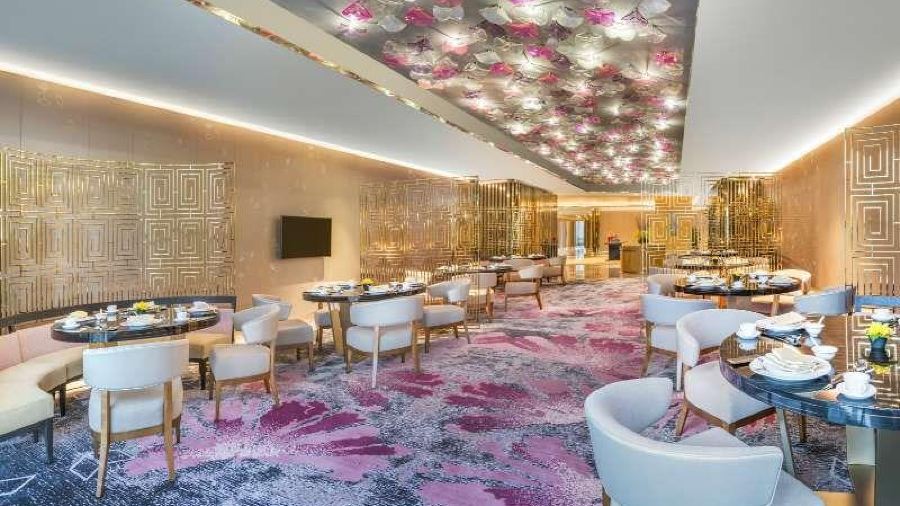
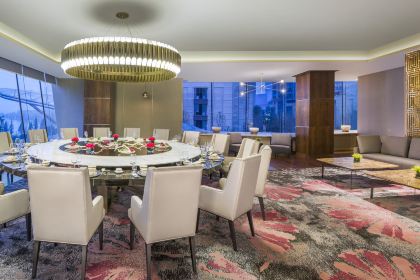
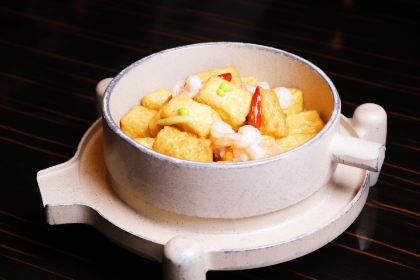
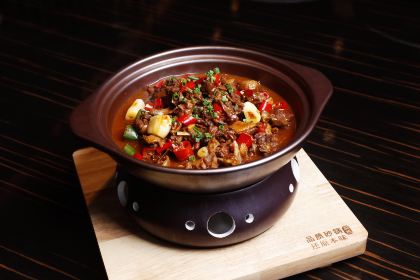
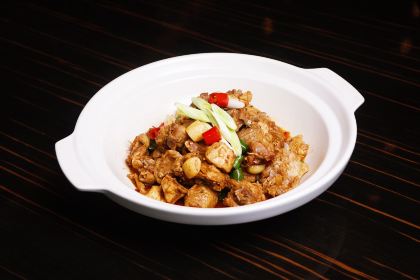
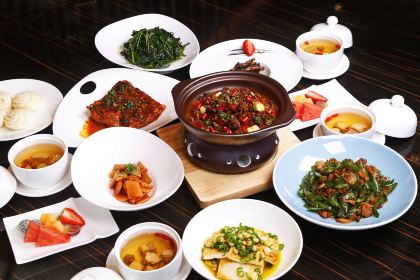
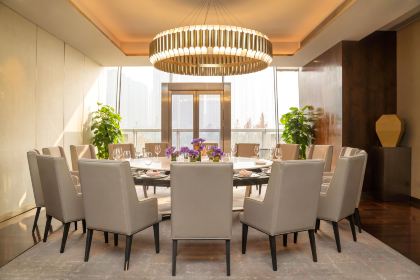
More
Open Now|17:00-21:00Show more
+8673188698888
No.1177 Huanhu Road
 蓝莓奶油冻There is a yard outside but we can't sit there because the sun is too strong. I went there for the blood duck because I have a lot of affection for this Yongzhou dish. This specialty dish, which is supposed to be very spicy, lacks the spicy element except for the taste of litsea cubeba oil. The meat is too big and the blood is not rubbed into the cracks of the bones, which is quite different. The scorpion soup and the preserved egg with pounded chili peppers are good. The marbled beef cooked in the hall is actually just fried beef on a stone slab because it is difficult to control the heat this way.
蓝莓奶油冻There is a yard outside but we can't sit there because the sun is too strong. I went there for the blood duck because I have a lot of affection for this Yongzhou dish. This specialty dish, which is supposed to be very spicy, lacks the spicy element except for the taste of litsea cubeba oil. The meat is too big and the blood is not rubbed into the cracks of the bones, which is quite different. The scorpion soup and the preserved egg with pounded chili peppers are good. The marbled beef cooked in the hall is actually just fried beef on a stone slab because it is difficult to control the heat this way.Reviews of The Peach Garden
Some reviews may have been translated by Google Translate
4.6/5Outstanding
All (45)
Latest
Photo reviews (34)
Positive reviews (5)
There is a yard outside but we can't sit there because the sun is too strong. I went there for the blood duck because I have a lot of affection for this Yongzhou dish. This specialty dish, which is supposed to be very spicy, lacks the spicy element except for the taste of litsea cubeba oil. The meat is too big and the blood is not rubbed into the cracks of the bones, which is quite different. The scorpion soup and the preserved egg with pounded chili peppers are good. The marbled beef cooked in the hall is actually just fried beef on a stone slab because it is difficult to control the heat this way.
The Peach Blossom Spring Chinese Restaurant at Changsha Meixi Lake Jinmao Luxury Collection Hotel has good taste, delicious flavors, authentic Hunan cuisine with a heavy flavor, a warm and comfortable environment, good and enthusiastic service, very good!
Delicious mandarin fish. It takes a lot of effort to fry this small mandarin fish until it is crispy on the outside and cooked to perfection. The mandarin fish meat is very fresh and fragrant, and goes very well with rice. Highly recommended.
Although it is not in the bustling city, it is worth coming to this elegant place to taste the delicious food.
A New Interpretation of Hunan Cuisine: A Symbiotic Exploration of Meixi Lake Jinmao Luxury Collection Hotel and "Mawangdui Culinary Culture" —From Millennial Han Banquets to Modern Culinary Innovation in Cultural Tourism I. A Modern Expression of Cultural Roots: From Lacquerware Tableware to Star-Rated Banquets The lacquerware tableware, bamboo slips, and cooking techniques unearthed from the Mawangdui Han tombs are not only living fossils of Chinese culinary history but also carriers of the Hunan cultural gene. Meixi Lake Jinmao Luxury Collection Hotel understands this well. Its Taohuayuan Chinese Restaurant, led by Chef Tan Hua, a "Master of Innovative New-Style Hunan Cuisine," infuses traditional Hunan cuisine with the culinary wisdom of Mawangdui: such as restoring ancient techniques like "ru," "zhi," and "ao," incorporating the flavors of Han Dynasty smoked and cured meats into modern chopped chili fish head, and using custom-designed lacquerware-patterned plates to recreate the elegance of "the emperor's pleasure." This innovation of "learning from the past to illuminate the present" preserves the ritualistic feel of Lady Xin Zhui's banquets while also catering to the deep-seated needs of contemporary people for cultural experiences. II. Scene Reconstruction: From Museum Exhibitions to Senses-Enhanced Immersion The launch of the "Flavors of Hunan: Mawangdui" Food Culture Experience Season marks a leap from static exhibitions to dynamic experiences of Hunan cuisine. Meixi Lake Hotel keenly captures this trend, revitalizing cultural perception through three scene innovations: 1. Spatial Narrative: The lobby's intangible cultural heritage workshop offers a Hunan embroidery experience class, where guests can personally embroider bookmarks with the words "Independent Autumn," capturing the heroic spirit of the poem "Qinyuanchun: Changsha" on silk thread; 2. Sensory Experience: The Yuanye Buffet Restaurant presents the "Mawangdui Hanfang Barbecue Feast," recreating the Han Dynasty's "zhi" (roasting) method with open charcoal grilling, accompanied by traditionally brewed linglu wine, allowing diners to travel back two thousand years on their palates; 3. Digital Empowerment: Collaborating with the Hunan TV program "Go to Flavorful Places in Hunan," the hotel utilizes macro lenses and AR technology to dynamically interpret lacquerware patterns into short films telling the story of Hunan cuisine, achieving a triple resonance of "visual—taste—culture." III. Industry Empowerment: From Single-Point Breakthrough to Ecosystem Co-construction The deep integration of the hotel and the Mawangdui cultural IP has fostered a unique business ecosystem: • Product Matrix: Developing the "Mawangdui Han Cuisine" series of set meals, transforming "deer jerky" and "swan soup" recorded in historical records into modern low-fat, high-protein dishes, aligning with the trend of healthy eating; • Channel Collaboration: Delivering restored ten-year-aged braised soft-boiled eggs, traditional Chinese pickled plums, and other snacks to communities through the "Jinmao Fireworks Mobile Station" food truck, allowing high-end dining to "break out of its circle" and reach the general public; • Cultural Export: Participating in the formulation of the "Mawangdui Cuisine Standardization Manual," promoting the inclusion of techniques such as "Hunan-style fermentation" and "medicine and food sharing the same origin" into the intangible cultural heritage system, providing a cultural support for "Hunan cuisine going global." IV. Value Enhancement: Finding Civilizational Dialogue in the Everyday Life The deeper significance of this collaboration lies in balancing commercial value and cultural mission: • For the hotel: Breaking through the stereotype of a "luxury container," reshaping brand recognition through cultural empowerment. For example, the "Eight Views of Xiaoxiang" plaques and custom-made Byredo fragrances placed in guest rooms echo the red and black aesthetics of Mawangdui lacquerware across time and space, allowing guests to experience public cultural memories in their private spaces. • For the city: Constructing a closed-loop consumption model of "cultural heritage—dining—tourism." Data shows that after linking resources such as the Meixi Lake Grand Theatre and Jinmao Lanxiu City, the length of stay for hotel guests increased by 2.3 hours, and surrounding cultural and creative consumption increased by 41%. • For culture: Overcoming the challenges of intangible cultural heritage inheritance through "old objects + new expressions." For example, applying Mawangdui lacquerware patterns to tableware and souvenir designs brings dormant cultural relics to life in daily life. Conclusion: A Civilizational Journey Without End When we savor "Hanfang Barbecue" under the starry sky by Meixi Lake, or decipher the millennia-old secrets of the "ru" method at the Taohuayuan Chinese Restaurant, we are essentially participating in a civilizational dialogue across time and space. The integration of Mawangdui culinary culture promotion with high-end hotels not only provides Hunan's cultural tourism with an innovative paradigm that is "experiential, consumable, and disseminable," but also inspires us that true cultural inheritance is not found in the glass display cases of museums, but in every innovation that allows ancient wisdom to truly nourish contemporary life. #ChangshaMeixiLakeJinmaoLuxuryCollectionHotel #MawangduiHanTombs #MawangduiFood #ChangshaHotelRecommendations